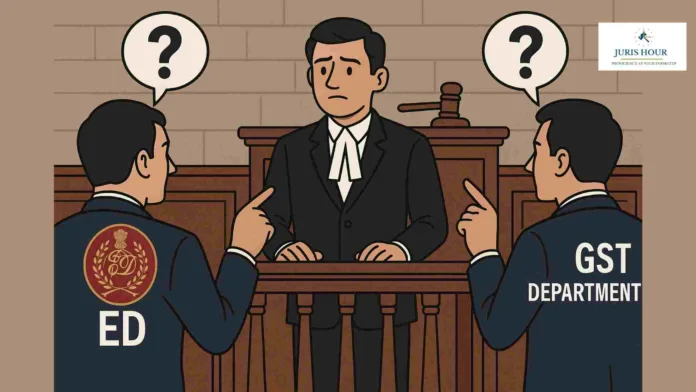A troubling trend is emerging in India’s legal landscape as enforcement agencies like Enforcement Directorate (ED) and GST department increasingly turn their attention to advocates, summoning them, raiding their offices, and seizing confidential documents/gadgets under the guise of investigation.
The recent summons issued by the Enforcement Directorate (ED) to Senior Advocate Pratap Venugopal — following similar action against Senior Advocate Arvind Datar and now GST Department’s recent action against Advocate Puneet Batra — has reignited fierce debate about the sanctity of attorney-client privilege and the independence of the legal profession.
ED Summons To Advocate
At the center of the controversy is legal advice related to the issuance of Employee Stock Ownership Plans (ESOPs) to Dr. Rashmi Saluja, the former chairperson of Religare Enterprises Limited (REL). Venugopal, in his capacity as Advocate-on-Record and partner at K J John and Co., had procured a legal opinion from Senior Advocate Arvind Datar for Care Health Insurance Ltd. (CHIL). He clarified that this occurred before his designation as a Senior Advocate on January 19, 2025, and that he formally resigned from the firm by January 31, 2025, in accordance with the Senior Advocates Designation Rules.
This development follows a similar summons to Senior Advocate Arvind Datar — a move that sparked outrage across the legal fraternity and was later withdrawn amidst public outcry. Legal professionals argue such steps represent a dangerous erosion of the age-old principles of client confidentiality and the constitutional independence of the Bar.
Court Slams GST Raid on Advocate’s Office
Parallel to the ED episode, the GST Department’s recent action against Advocate Puneet Batra has drawn sharp judicial scrutiny. Batra, a well-established practitioner in tax and criminal law, found his office — and by extension, client information — under seizure following a GST investigation linked to a client, Martkarma Technology Pvt. Ltd.
Batra contends that he withdrew his representation after being unable to reach the client post-search, and that he had informed the GST Department accordingly. Nonetheless, GST officers conducted a search on July 25, 2025, and seized sensitive material, including client files, firm documents, and a CPU containing 1250 GB of data — potentially related to over 100 active legal cases.
The Delhi High Court took strong exception to these actions, directing the Department not to open or access the contents of the seized CPU without the presence of the petitioner or his authorized representative. The bench of Justice Prathiba M. Singh and Justice Shail Jain emphasized the constitutional protections afforded to advocates, stating:
“This Court would like to be first satisfied as to in what manner a search and seizure was conducted at the office of an Advocate, inasmuch as any documents that may have been given by the client to his lawyer are purely confidential in nature and are protected by attorney-client privilege.”
The matter is scheduled for further hearing on August 4, 2025, with the GST Department ordered to file a detailed affidavit justifying the search.
Legal Fraternity Pushes Back
In a strong display of unity, the Supreme Court Advocates-on-Record Association (SCAORA) issued a scathing statement condemning the ED for issuing a notice to Senior Advocate Arvind Datar. The Association labeled it an “alarming case of investigative overreach,” warning that such actions jeopardize both the rule of law and the right to independent legal counsel.
“This action by the ED is not only unwarranted but reflects a disturbing trend of investigative overreach that threatens the independence of the legal profession,” the statement said.
It stressed that conflating legal counsel with complicity in alleged misconduct violates constitutional protections and sets a dangerous precedent that could deter lawyers from offering candid legal advice.
The withdrawal of the notice against Datar has done little to quell concerns. Legal experts point out that the very act of issuing such summons has a chilling effect on legal independence and citizens’ right to confidential counsel.
Turf War Within the Legal Community
The controversy has also exposed internal fissures within the legal fraternity. Dr. Vikas Singh, President of the Supreme Court Bar Association (SCBA), criticized SCAORA for overstepping its mandate by commenting on broader legal policy issues. Singh claimed that as a body limited to Advocates-on-Record, SCAORA lacks the standing to speak for the entire Bar.
Despite this internal discord, many lawyers argue that the issue transcends institutional boundaries. “This is not about one association or another,” said a senior lawyer on condition of anonymity. “This is about protecting the foundational principles of justice. Today it’s one advocate, tomorrow it could be any of us.”
Conclusion: A Dangerous Precedent
What appears at first glance to be isolated investigations is, to many in the legal community, indicative of a systemic shift toward the erosion of attorney-client privilege and the coercive overreach of enforcement authorities. Whether under ED or GST scrutiny, the legal profession finds itself caught in the crosshairs of investigative zeal — raising critical questions about the independence of the Bar, the integrity of due process, and the future of legal confidentiality in India.
As the legal community braces for further hearings and possibly more summonses, the judiciary’s response in the coming months will likely determine the extent to which the rule of law and the independence of legal counsel remain intact in the country’s constitutional framework.

